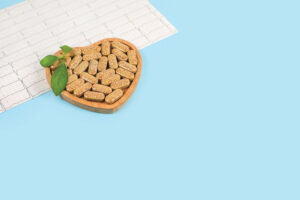Now in its fourth year since its launch, ubiquinol is no rookie to the dietary supplement industry. Dozens of finished products feature ubiquinol, a form of CoQ10 so reactive that its commercial stability was only made available recently. CoQ10 researchers had known about ubiquinol for decades, and their understanding of this molecule continues to broaden. In fact, there are many ongoing studies on ubiquinol in the U.S. and worldwide.
Cardiovascular Health
Every year since 1963, the U.S. president designates the month of February as American Heart Month. It’s a time to reflect on the enormous efforts of scientists and health care professionals, many of whom dedicate their lives to strengthen the fight against America’s leading cause of death for both men and women. In 2006, half of the deaths due to heart disease were women— clearly indicating that this disease impacts genders equally, though they manifest differently.1 The known risk factors contributing to heart disease are preeminently elevated blood lipids and hypertension, but there are many other factors, such as antioxidant capacity and genetic considerations. Consider the genetic condition known as familial hypercholesterolemia: individuals with familial hypercholesterolemia produce excessive amounts of LDL-cholesterol, resulting in an acceleration in the development of atherosclerosis.
Countering cholesterol’s double edge is a primary objective for nutritional scientists. Many consumers choose to utilize a statin to counter cholesterol synthesis, while others find products that can counter apolipoprotein-B synthesis, a required structural component of atherogenic lipids such as LDL-cholesterol.Fractions of LDL, specifically LDL-3 (the heaviest subfraction), are known to be particularly susceptible to oxidation. In general, it is not the lipids or even the amount of lipids that are detrimental risk factors—it is oxidized (peroxidized) lipids.
Ubiquinol is the antioxidant (unoxidized or reduced) form of CoQ10, and it is the most protective antioxidant in the early stages of LDL oxidation.2 In fact, its antioxidant capacity is so strong that it can regenerate other antioxidants
Such as vitamins C and E. The oxidization of the LDL cholesterol is considered by some cardiovascular researchers as the initiating point in the production of atherosclerotic plaque.3 The process of lipid oxidation occurs through the stages of initiation, propagation and termination. A distinguishing feature of ubiquinol is its ability to affect both initiation and propagation steps of the free radical chain reaction, a versatility not shared by other antioxidants.
For instance, alpha tocopherol (the major lipid antioxidant in the blood) inhibits lipid peroxyl LOO• radicals, a propagation step, whereas ubiquinol (the major lipid antioxidant in tissues) influences both initiation and propagation steps.4
A recently published study by researchers from Germany’s University of Kiel and Japan’s Shinshu University may offer another mechanism for ubiquinol’s role in lipid and cardiovascular health.5 In this study, a particular mice strain called SAMP1 (Senescence Accelerated Mice Prone 1) were utilized as they are characterized by high oxidative stress status, and therefore a good model to study the potential effects of antioxidants. Based on previous in-vitro findings of differences between ubiquinone and ubiquinol, the researchers hypothesized about the presence of redox-dependent genes.After 14 months of ubiquinone or ubiquinol supplementation, the mice liver tissue was analyzed for a variety of gene expressions via microarray testing.The gene expression profiling demonstrated a functional connection between ubiquinol and the following signaling pathways: PPAR-á (PPAR-á is strongly involved in lipid metabolism), LXR/RXR and FXR/RXR. Specifically, the researchers identified 11 different ubiquinol-dependent genes related to cholesterol and ipid/lipoprotein metabolism.With the exception of one gene, ubiquinone did not have any effect on these genes. The single exception was the gene CYP51, which, interestingly, was down-regulated by ubiquinol but was up-regulated by ubiquinone. The CYP51 gene encodes for the cytochrome P450 enzyme lanosterol 14- demethylase, which is involved in the post-squalene part of cholesterol biosynthesis in mammals. Additionally, it was also seen that the ubiquinol experimental group was more effective in increasing total CoQ10 concentrations than the ubiquinone-administered group. This study provides preliminary evidence that although ubiquinone and ubiquinol are molecular siblings, they exert strikingly different effects.
Kidneys and Antioxidants
Another condition that is growing globally is chronic kidney disease, which is a gradual loss of kidney function. Not only can chronic kidney disease lead to end-stage kidney failure, but it can also increase the risk of cardiovascular disease.One of the primary functions of these super-processing organs is to filtrate waste from circulation.
Based on observations that antioxidants mitigate renal dysfunction, researchers from the University of Tokyo (Department of Urology and Department of Nephrology and Endocrinology) investigated the role of ubiquinol in an animal model of chronic kidney disease. The study utilized three experimental groups: a control group, a high salt diet group and a high salt diet plus ubiquinol group. The high salt diet increased oxidative stress (measured by the generation of superoxide anion in kidney tissue), increased hypertension and induced albuminuria. On the other hand, the high salt diet plus ubiquinol group demonstrated significant renoprotection by ubiquinol, including decreased generation of superoxide anion (antioxidant effect), decreased urinary albumin and amelioration of hypertension.6 While the mechanism of this action was not made clear, the scientists stated that in this experimental model, ubiquinol exerted renoprotective effects directly by antioxidant action and indirectly by antihypertensive effect. This study marks the first experimental research with the antioxidant ubiquinol in an animal model of chronic kidney disease.
A Higher Ground
Practically speaking, there are a variety of ubiquinol strengths available, ranging from 50mg to 200mg soft gels. Dr. Peter Langsjoen, a widely published cardiologist with decades of experience utilizing CoQ10, noted that the desired therapeutic blood values of CoQ10 continue to be recalibrated higher. Specifically, Langsjoen demonstrated that in terms of rough values for advanced cardiovascular disease patients (Class IV CHF), CoQ10 scientists in 1980 considered therapeutic levels to be at 1.0mcg/mL of plasma, whereas today’s research indicates values need to be above 3.5mcg/mL. Research from his Texas clinic with 187 subjects has shown ubiquinol to raise plasma values to 4.3mcg/mL (average amount of 276mg per day), improve ejection fractions and improved functional classification of heart failure index.7
These studies showing ubiquinol’s involvement in renal health and genes related to lipid/lipoprotein metabolism are just a snapshot of what’s taking place in the world of ubiquinol. When the new data comes out, I’ll line it up and bring it to you for the next ubiquinol update.
Sid Shastri, Msc, is a product development manager for Kaneka Nutrients.




![[Sponsored Video] Special Report: Bergamonte®, the Untold Story](https://vitaminretailer.com/wp-content/uploads/2023/06/sponsored-video-special-report-b-300x169-1707947265.jpg)







